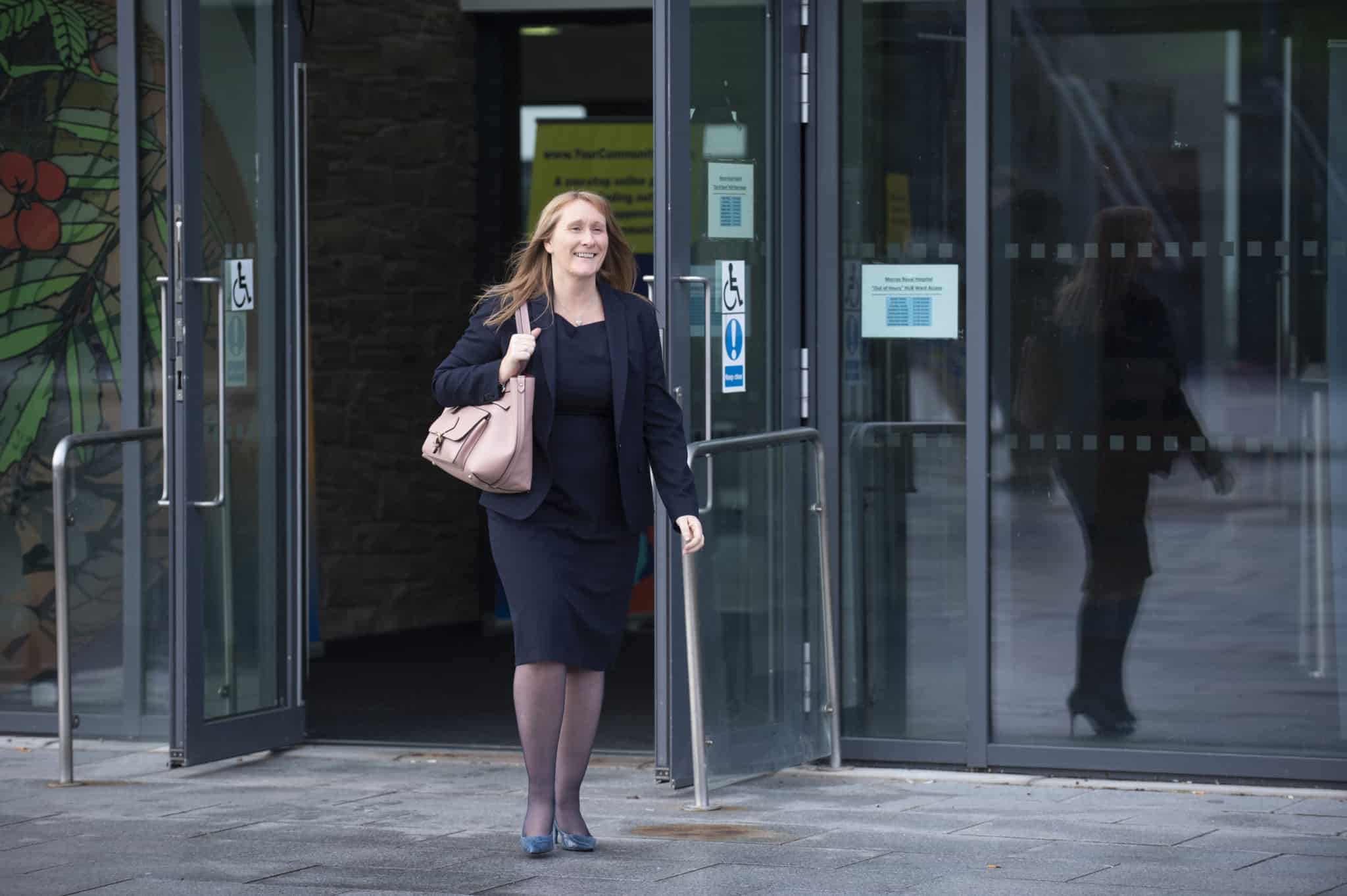Lindsey Griffin
Community Mental Health Nurse
Perth

I moved into a new post last year and now work as a Clinical and Professional Team Manager for Perth and Kinross Health and Social Care Partnership. I am based at Murray Royal Hospital in Perth but I travel between sites managing a range of staff that collectively are an integrated care team. Perth and Kinross covers a large area combining rural, town and city working. My role has a wide remit and within the community I work alongside Adult Mental Health, Older People’s Mental Health, Mental Health and Wellbeing, Occupational Therapy and Physiotherapy Rehabilitation, ECT, and Mental Health Occupational Therapy and Physiotherapy Teams.
 I have a genuine interest in people and how they experience their world, I think that’s what I love about my role. Working within the community, you are in such a privileged position of being invited into a person’s life – to see life how they see it. Community Mental Health Nursing really is the storytelling profession – it is a profession of the heart. For me it’s about working alongside people who often struggle to have a voice, to create an intimacy of understanding with people and work with them to realise their value and potential – what their inner light is. As a community mental health nurse, parity of esteem is really close to my heart. Collectively we need to challenge the silence, the injustice and the stigma around mental ill health and place the same value on mental health as we do on physical health. This is a lifelong commitment for me and I work hard to challenge inequalities within the mental health arena, setting the tone for inclusivity, candour and collaboration.
I have a genuine interest in people and how they experience their world, I think that’s what I love about my role. Working within the community, you are in such a privileged position of being invited into a person’s life – to see life how they see it. Community Mental Health Nursing really is the storytelling profession – it is a profession of the heart. For me it’s about working alongside people who often struggle to have a voice, to create an intimacy of understanding with people and work with them to realise their value and potential – what their inner light is. As a community mental health nurse, parity of esteem is really close to my heart. Collectively we need to challenge the silence, the injustice and the stigma around mental ill health and place the same value on mental health as we do on physical health. This is a lifelong commitment for me and I work hard to challenge inequalities within the mental health arena, setting the tone for inclusivity, candour and collaboration.
 The resilience of the human spirit that is displayed by the people who use our service, by carers, family and staff is my inspiration. Essential to the way I work, is the strengthening of these voices in the development and delivery of services. People’s stories are, to me, one of the most formidable motivators in health service change and are at the heart of co-creating our improvement journey. A core part of my role is being in the privileged position to provide and support the conditions necessary for person–centred care to flourish. As a manager, I am responsible for ensuring the clinical contribution to service delivery is of the highest quality and as a nurse, the focus on the minutiae of a situation is instilled in me. This contributes to me understanding the uniqueness of teams and in supporting, supervising and inspiring them, ensuring they have the skills, knowledge and resources to address the mental health and wellbeing needs of the people who use our services and their families/carers.
The resilience of the human spirit that is displayed by the people who use our service, by carers, family and staff is my inspiration. Essential to the way I work, is the strengthening of these voices in the development and delivery of services. People’s stories are, to me, one of the most formidable motivators in health service change and are at the heart of co-creating our improvement journey. A core part of my role is being in the privileged position to provide and support the conditions necessary for person–centred care to flourish. As a manager, I am responsible for ensuring the clinical contribution to service delivery is of the highest quality and as a nurse, the focus on the minutiae of a situation is instilled in me. This contributes to me understanding the uniqueness of teams and in supporting, supervising and inspiring them, ensuring they have the skills, knowledge and resources to address the mental health and wellbeing needs of the people who use our services and their families/carers.
 I have been working within mental health care since 1988 and have 20 years of community mental health nursing experience, so I bring significant clinical, leadership and management expertise to the role. My area of expertise is in working with complexity and I often support a range of multi–agency situations that can be challenging. I strive to create authentic dialogue with people and am a great advocate of kindness; it goes a long way in making meaningful connections and resolving issues. One of my character traits is that I have a real interest in people and finding out what makes an individual tick. I enjoy working with individuals who challenge me – they are the people who take you out of your comfort zone. But, for me, it constantly goes back to listening deeply, being gentle and kind. I’m honest and direct and will spend as much time with people as is needed to make a meaningful connection with them. I’m known as tenacious, my mantra being “I can and I will, watch me”. I am creative in how I navigate ways of working across professions and across integrated care teams. I need to be able to build trusting relationships and acknowledge people for who they are and where they are at in their lives. These are the skills of a clinical expert community mental health nurse, but they apply equally to my leadership and management role.
I have been working within mental health care since 1988 and have 20 years of community mental health nursing experience, so I bring significant clinical, leadership and management expertise to the role. My area of expertise is in working with complexity and I often support a range of multi–agency situations that can be challenging. I strive to create authentic dialogue with people and am a great advocate of kindness; it goes a long way in making meaningful connections and resolving issues. One of my character traits is that I have a real interest in people and finding out what makes an individual tick. I enjoy working with individuals who challenge me – they are the people who take you out of your comfort zone. But, for me, it constantly goes back to listening deeply, being gentle and kind. I’m honest and direct and will spend as much time with people as is needed to make a meaningful connection with them. I’m known as tenacious, my mantra being “I can and I will, watch me”. I am creative in how I navigate ways of working across professions and across integrated care teams. I need to be able to build trusting relationships and acknowledge people for who they are and where they are at in their lives. These are the skills of a clinical expert community mental health nurse, but they apply equally to my leadership and management role.

The mental health impact of the pandemic is predicted to be significant both in the short and longer term and we will see people, more than ever, requiring access to a wide range of person-centred mental health interventions. As the people who use our services, their carers, staff and our communities try to make sense of our current situation, never has there been a more important time to ask people what they really need, what their hopes and dreams are and how we might work together to make these a reality.
Our teams have been committed to finding innovative and pragmatic options for people to receive ongoing treatment interventions during the pandemic. A range of one to one and group interventions are being undertaken over the telephone and through virtual means and are being viewed as positive by many. Face to face visits to homes, care homes and clinics continue for people with complex mental health issues and we are working proactively to ensure that everyone is prepared for staff arriving in full PPE.
As with many teams, staff have been deployed to assist in areas that have been affected by COVID-19. I have worked hard to support them and to match skills to potential opportunities. A key role for me has been ensuring that the team’s mental health and wellbeing remains at the forefront of all that we do regardless of the location of our current workplace.
I have witnessed great strength and resilience both individually and collectively from patients, carers and staff as they have come together to help one another through the pandemic. I often hear staff describing themselves as ordinary people who are just doing their job. They are however extraordinary people undertaking extraordinary work to support their communities and colleagues to flourish.